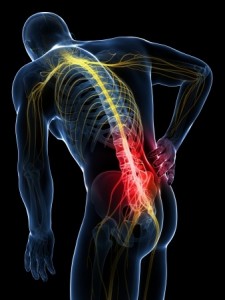Spinal Cord Stimulators
 Spinal cord stimulators are devices places in the spinal cord to reduce pain in the body. Patients undergo a trial prior to test the effectiveness of the stimulator. 50% pain reduction or more is considered a successful trial that would be considered for permanent implantation. Certain psychological factors, though rare, can be contraindicated for a stimulator. Also, certain psychological issues that exacerbate pain, such as severe depression or bipolar disorder, could interfere with the accuracy of the trial, and may need to be treated prior to the trial. This could prevent a false negative trial occurring (negative reading when the device was actually effective).
Spinal cord stimulators are devices places in the spinal cord to reduce pain in the body. Patients undergo a trial prior to test the effectiveness of the stimulator. 50% pain reduction or more is considered a successful trial that would be considered for permanent implantation. Certain psychological factors, though rare, can be contraindicated for a stimulator. Also, certain psychological issues that exacerbate pain, such as severe depression or bipolar disorder, could interfere with the accuracy of the trial, and may need to be treated prior to the trial. This could prevent a false negative trial occurring (negative reading when the device was actually effective).
Intrathecal Pain Pumps
Intrathecal pain pumps are devices that deliver a small dose of opioids (usually morphine) into the spinal column. The amount of medication is very small but usually more effective than oral medication as it goes directly to the spine. There is a trial of the pump prior to implantation, just as there is with a stimulator. If the trial is successful, there is a decision to go to implantation. Just as with the stimulator, there are psychological issues that are contraindicated for a pain pump. There is also a greater overdose risk with the pump as oral opioids, benzodiazepines, and alcohol could interact with the intrathecal opioid of the pump and slow a patient’s breathing to a dangerous level. There are also certain psychological factors that may need to be treated prior to the pump trial.
It is standard of care and required by most insurance companies that patients receive a pre-surgical evaluation prior to implantation of these devices. Some physicians have the evaluations prior to the trial and some have them only after a successful trial, depending on preference.
Pre-surgical Spine Evaluation
Spinal surgery can consists of less invasive procedures, such as a micro discectomy, to a multi-level fusion. A psychological spine evaluation could assist in helping determine how well a person would tolerate an invasive spine surgery. There are also certain psychological factors that could limit a person’s successfulness with spine surgery that may need to be treated prior to and/or after surgery.
What to Expect Your Evaluation
For your psychological pre-surgical pump/stimulator evaluation, please bring your ID and insurance card with you. You will meet with a health psychologist for a full clinic interview to go over your pain, medical history, and how the pain is affecting your life. You will also complete a series of psychological tests. These are paper pencil tests in our office and there is no time limit. You may be mailed a packet of these tests prior to your appointment. If you could complete this packet and bring it to your evaluation, it would shorten the length of your appointment. There are other tests that will have to be completed in the office. Some of these tests have general psychological questions that may seem unusual. Please just answer them to your best ability. Please bring your reading glasses. If you have difficulty reading, we have some of tests on audio, or you could have a friend or family member assist you with the completion of the test.
The health psychologist will take the information from talking to you, your psychological testing, and your medical records to compile a psychological pre-surgical pain evaluation. This will include treatment recommendations that will be given to your referring physician.
Treatment
If treatment is recommended, you will be informed by the health psychologist. Treatment usually consist of standard chronic pain psychology and other assistance if needed (have link to chronic pain)
